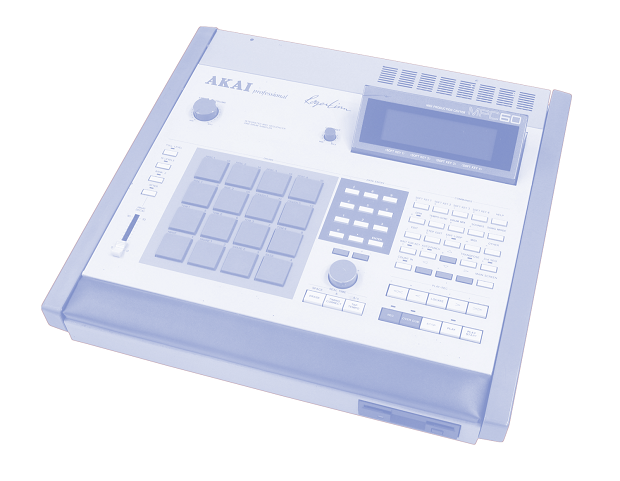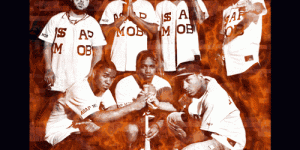Two hands, sixteen pads: 25 years of the MPC
by Aaron Zorgel
April 17, 2013
If you’re sitting around shooting the shit with a bunch of hip-hop heads, who’s name is most likely to get mentioned during the inevitable “founding fathers of hip-hop” melee? DJ Kool Herc? Afrika Bambaataa? Grandmaster Flash? How about a guitarist, songwriter, engineer, and all-around nerdy dude by the name of Roger Linn?
If you’re sitting around shooting the shit with a bunch of hip-hop heads, or, if you’re anything like me, lurking a heated thread on a forum, who’s name is most likely to get mentioned during the inevitable “founding fathers of hip-hop” melee? DJ Kool Herc? Afrika Bambaataa? Grandmaster Flash? How about a guitarist, songwriter, engineer, and all-around nerdy dude by the name of Roger Linn?
Admittedly, the groundwork for hip-hop had already been laid by the time Roger Linn made his contribution, but that doesn’t dull his impact as an important behind-the-scenes figure. Twenty-five years ago, he supported hip-hop’s musical sustainability by designing a sampler, sequencer, and drum machine with unlimited variability. Linn might not be considered the rap-game Magellan, but the creation of the Akai Music Production Center in 1988 would be nothing short of pivotal for hip-hop, electronic, and sample-based music production. Though it has been influential across all genres of music—Mike Shinoda from Linkin Park uses an MPC2000—it’s hard to consider the MPC as anything other than a crucial nucleotide in the DNA of hip-hop.
Before partnering with Akai, Roger Linn, a songwriter and guitarist for hire, owned and operated Linn Electronics, the banner under which he designed the LM-1 Drum Computer. The LM-1 was one of the first programmable drum machines, and it was the world’s very first to use digital samples. The LM-1 was used on recordings by Prince, Michael Jackson, Kraftwerk, and by countless others in the ‘80s, and as a result, it fetches a pretty penny amongst vintage gear collectors. (So, if you see one at your local swap meet, scoop it up and sell it to me.) Linn Electronics released two other drum machine models before going out of business in 1986, at which point Linn was recruited for a collaboration by Japanese consumer electronics company Akai.

Linn’s first project for Akai was the MPC60, a music production tool that combined midi sequencing with audio sampling, using sixteen velocity-sensitive touch pads, each set to trigger the playback of a different sample. The MPC60’s factory-loaded sound library is now unmistakably iconic, but the definitive characteristic of Linn’s MPC series is the ability to load your own samples, build your own sound library, and save your own drum kits within the unit. Finally, music producers had a relatively affordable (and somewhat portable) all-in-one workstation, with unlimited potential for manipulating samples and sequencing original music. Since the release of the MPC-60 in 1988, Akai has released eleven other MPC models, including an app for iPad, but it all began with Roger Linn and the MPC60. Linn’s MPC innovations ultimately earned him a Grammy for Lifetime Technical Achievement in 2011, which puts him in the same company as Les Paul, Leo Fender, Bob Moog, and even some guy named Thomas Alva Edison.
The Music Production Center was immediately embraced by hip-hop producers, due to its flexibility, portability, and especially, its affordability. Some producers even made it the centerpiece of their studio. Chances are—whether it’s Dr. Dre, J Dilla, Swizz Beats, or The Neptunes—your favourite producer has chopped up beats on an MPC. Though it was originally conceived strictly as a music production platform, the MPC has more been recently been looked at as a playable instrument for live performances. No artist showcases the MPC’s playability better than the 23-year-old reigning MVP of the MPC (shh, don’t tell Pete Rock) Abraham Orellana, better known as araabMUZIK. Originally trained as a live drummer, Orellana hammers on the sixteen pads with grace and precision, dazzling live audiences with his mastery of what has come to be known as “hand-drumming.”
On the 25th anniversary of the release of the MPC60, here are some classic and contemporary artists and producers who have made the iconic sampler/sequencer combo part of their musical genesis.
araabMUZIK
araabMUZIK cut his teeth making beats for Dipset on his MPC2500, but his live shows have become a spectacle, showing massive festival audiences what’s possible with 16 pads and the fastest trigger fingers in hip-hop.
Party Supplies
Party Supplies’ frontman Justin Nealis runs everything—YouTube videos and public access television clips included—through his MPC1000, before bouncing a stereo mix to Pro Tools. He also used it to craft the instrumentals for Action Bronson’s excellent Blue Chips mixtape last year.
The xx
Jamie xx uses up to three MPCs (two MPC500s and one MPC1000) at one time, triggering dreamy, fuzzed-out samples, while tapping out tight, sub-busting beats. Jamie had the reverse experience of most MPC users; initially, he used it exclusively as a live tool, without realizing that it was programmable, and designed for studio beat production.
Rick Rubin
Rick Rubin co-founded Def Jam in 1984, and the affordability of the MPC compared to other drum machines actually helped shape the sound of early hip-hop and rap, appearing on recordings he produced for the Beastie Boys, Run-D.M.C., and Public Enemy.
The Alchemist
The Alchemist is one of the most well-known sample-based hip-hop producers active today, and the MPC has always been a staple of his crate-digging sound. In an interview with Akai, he notes that all of his production idols—Pete Rock, DJ Premier, and Diamond D—are MPC-based producers.
RJD2
RJD2 built a wearable, spinning, wireless MPC remote for his live rig. He straps the controller to his waist, and can roam free around the stage while tapping out beats. If he’s feeling showy, he can give the whole unit a spin after completing a tricky beat flip.
Kanye West
Even though araabMUZIK alleges that Kanye West had his people film him working on the MPC so he could bite his style, one of the most widely-seen uses of the MPC in recent memory is Kanye’s “Runaway” performance on the 2010 VMAs and on Saturday Night Live, where he used an MPC to trigger piano, drum, and Rick James vocal samples.
Exile
araabMUZIK isn’t the only one who can play the MPC like it has 88 keys. Aleksander Manfredi, professionally known as Exile, has produced songs for Mobb Deep, Jurassic 5, and Pharoahe Monch, and his live show certainly demonstrates that he knows his way around a beat machine.
Born Gold
Born Gold’s Cecil Frena built a leather jacket that uses LED technology and an Xbox Kinect to map his body’s movements, translating that into a midi signal, and allowing him to trigger samples by moving his limbs through specific zones. He’s also got an MPC-style drum pad on the jacket’s lapel. Science!
Pete Rock
Hip-hop legend Pete Rock started out using the E-mu SP-1200, another classic drum machine and sampler, but he switched to the Akai MPC2000XL in 2003, and hasn’t looked back. How hard does Pete Rock rep the MPC? Check the lyric sheet for “Don’t Be Mad”: “I’m the fuckin’ poster boy for the MPC.”
DJ Shadow
Instrumental hip-hop icon DJ Shadow worked exclusively with the MPC between 1992 and 1996, and last year, he released an archive of these early recordings.
Erykah Badu
Erykah Badu first learned how to flip beats on an MPC from J Dilla, and she still uses MPC sampling and beat construction in her live shows today.
J Dilla
J Dilla could have reverse engineered the manual for the Akai MPC3000 without ever reading it. Instead of using the MPC to gloss over a sample’s imperfections, he used it to heighten the sonic nuances in a performance, presenting the source material in a completely original way. R.I.P.
DiViNCi
DiViNCi is the sole composer/producer for Orlando hip-hop quartet Solillaquists of Sound, and in a live setting, he’ll use three or four MPCs simultaneously. He’s easily one of the most electrifying live MPC performers to watch, often using both hands and his face to trigger samples.
DJ Premier
It’s almost impossible to overstate DJ Premier’s influence on hip-hop production and DJing. In an interview with Akai, Preem has said that the limited 60 seconds of sample time on the MPC60 II influenced his production style, because it forced him to make every second count.
Just Blaze
Just Blaze takes MPCs really seriously. As an early adopter of the MPC5000 in 2008, Just Blaze posted a detailed rant with a list of bugs and issues he had encountered while testing the unit, practically begging Akai to revisit the operating system. He only rants because he cares.

This article originally appeared in the April 2013 Issue of AUX Magazine.
Download and subscribe for free in the app store.
Tags: TechMusic, Featured, Akai, AraabMuzik, Born Gold, DJ Premier, DJ Shadow, Erykah Badu, J Dilla, Just Blaze, Kanye West, Party Supplies, Rick Rubin, The Alchemist





